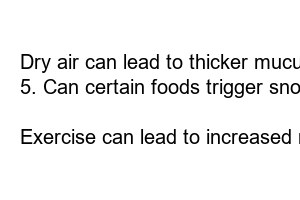코딱지가 자주 생기는 이유
Do you ever wonder why you always seem to have a runny nose? **Snot** is a common occurrence for many people, especially during the colder months. But have you ever stopped to think about why it happens? In this blog post, we will explore the reasons behind why snot often occurs in English.
**What is snot?**
Snot is a slang term for mucus, which is a viscous substance produced by the mucous membrane in your nose. It serves as a protective barrier against viruses, bacteria, and other unwanted particles that try to enter your body through your nasal passages.
**Why does snot happen?**
Snot occurs when your body produces an excess amount of mucus in response to irritants such as allergens, dust, or germs. This overproduction of mucus is your body’s way of trapping and removing these irritants from your **respiratory system**.
**How does snot help you?**
Snot plays a crucial role in protecting your body from harmful invaders. It helps to humidify the air you breathe, trap and remove irritants, and prevent them from entering your lungs. Without snot, you would be more susceptible to respiratory infections and illnesses.
**What causes runny nose?**
A runny nose is a common symptom of colds, allergies, or sinus infections. When your body senses that there is an irritant present, it increases mucus production to help flush it out. This excess mucus then drips out of your nose, causing that annoying runny nose sensation.
**How can you prevent snot?**
While it is impossible to completely prevent snot from occurring, there are steps you can take to reduce its frequency. Stay hydrated, wash your hands frequently, avoid allergens, and practice good respiratory hygiene to help keep snot at bay.
**When should you see a doctor?**
If your snot is accompanied by other symptoms such as fever, severe headache, or difficulty breathing, it may be a sign of a more serious condition. In this case, it is essential to consult a healthcare professional for further evaluation and treatment.
In summary, snot often occurs in English as a natural response to irritants in the environment. Your body produces mucus to protect itself from harmful invaders and help maintain optimal respiratory health. While it may be annoying at times, snot serves a vital role in keeping you healthy and well. So the next time you feel *sniffly*, remember that your body is just doing its job to keep you safe and healthy.
**FAQs about snot:**
1. Why does snot turn yellow or green?
Yellow or green snot is a sign that your body is fighting off an infection. It may be a good idea to see a doctor if you notice this color change.
2. Can allergies cause snot?
Yes, allergies can trigger an overproduction of mucus, leading to a runny nose and congestion.
3. Is it normal to have snot every day?
Yes, it is normal to have some mucus in your nose every day. However, if you experience excessive snot or notice changes in its color or consistency, it may be worth monitoring or seeking medical advice.
4. How does humidity affect snot production?
Dry air can lead to thicker mucus production, while humid air can help keep your nasal passages moist and reduce congestion.
5. Can certain foods trigger snot?
Yes, spicy foods, dairy products, and foods high in histamines can sometimes trigger snot production in some individuals.
6. Does exercise affect snot production?
Exercise can lead to increased respiratory rate and mucus production. This is normal and helps your body regulate its temperature during physical activity.

